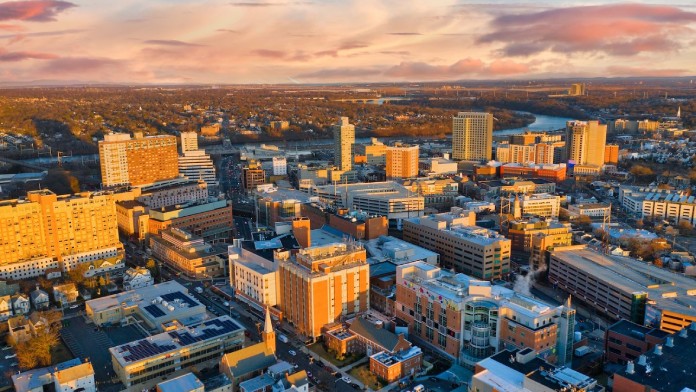Drug and Alcohol Abuse Statistics in New Brunswick, NJ
Recent alcohol- and drug-use statistics for New Brunswick and Middlesex County, New Jersey include:1, 3, 4, 5, 6
Roughly 15% of Middlesex County residents report engaging in excessive drinking monthly.
In 2020, 40% of all Middlesex County residents admitted to rehab said heroin was their primary drug, and 35% said alcohol was their primary substance of use.
Approximately 61% of people admitted to rehab in Middlesex County in 2020 were between the ages of 25 and 44.
In 2020, 56% of Middlesex County residents who were admitted to rehab identified as white, 21% identified as Hispanic, and 19% identified as Black.
Levels of Substance Abuse Care
Multiple levels of care are available for addiction treatment. Some New Jersey residents move through each of these levels of treatment, while others need only the least intensive care.
Alcohol and Drug Detoxification
Detox is completed under medical supervision in a hospital, inpatient, or outpatient setting. This is the process of safely and comfortably removing drugs or alcohol from your system. Once detox is complete, you can move forward with other treatment services.
Inpatient Drug and Alcohol Rehab
Inpatient rehab, also called residential treatment, involves living at a treatment facility to receive 24/7 care. Services usually include individual and group therapy, medication, recreational therapy, and nutritional counseling.
Partial hospitalization programs (PHPs)
PHPs allow New Jersey residents to live at home while receiving treatment through a hospital. This program usually provides the same treatment services as inpatient care, but you can return home during non-treatment hours.
Intensive Outpatient Programs (IOPs)
IOPs are a step down from PHPs, allowing you to attend a few hours of counseling each week while living at home. This provides time to maintain a work schedule or fulfill other obligations.
Standard Outpatient
Standard outpatient programs involve just one to two hours of treatment per week. This level of treatment involves the least supervision and is appropriate for highly motivated people who have a strong support system.
Aftercare
Also known as relapse prevention, aftercare starts once your rehab program is complete. It includes ongoing support such as 12-step programs, sober living homes, and therapy.
How to Pay for Drug Rehab in New Brunswick, New Jersey
New Jersey Medicare
New Jersey Medicare provides health insurance to New Jersey residents who are 65 or older or have certain other health conditions. You are automatically enrolled in this program at age 65 if you are receiving Social Security or Railroad Retirement Board retirement benefits.
Many Medicare options are available in New Jersey that go beyond basic coverage, such as Medicare Advantage Plans and Medigap plans. The New Jersey State Health Insurance Assistance Program (SHIP) offers free help with questions regarding Medicare benefits and policies. Not all treatment centers accept Medicare insurance coverage, so always do your research before choosing a provider.
New Jersey Medicaid
New Jersey’s Medicaid program provides health insurance to New Jersey residents who are aged, blind, or disabled, to pregnant women, and to parents/caretakers and dependent children. To be eligible for New Jersey Medicaid, a person must be a resident of New Jersey, be a U.S. Citizen or qualified alien, and meet specific standards for financial income. You must apply for Medicaid coverage in New Jersey, and the rehab program must accept Medicaid as a method of payment.
Sliding Scale Rehabs
Sliding scale rehabs assist New Jersey residents who have limited financial resources to pay for treatment. You will be charged based on what you can reasonably afford to pay. To qualify for a sliding scale rehab in New Jersey, you typically need to provide proof of income.
TRICARE in New Jersey
New Jersey TRICARE (East region) is a government program that provides health insurance coverage for U.S. military personnel, veterans, and their families. TRICARE covers addiction treatment services; however, various plans differ in their coverage.
IHS-Funded Drug Rehabs
The Indian Health Service (HIS) funds addiction treatment for Indigenous people and Alaskan Natives in New Jersey and nationwide. This coverage is provided even if other insurance payment is available.

Traveling to and Within New Brunswick, NJ
If you’ll be traveling to New Brunswick for rehab or to visit a loved one in a local addiction treatment center, this information may help you plan your trip:
- Newark Liberty National Airport is situated roughly 24 miles from New Brunswick. Other nearby airports include John F. Kennedy International Airport (49 miles away) and La Guardia Airport (54 miles away).
- New Brunswick is well-connected to several major transit routes, including Interstate 95, U.S. Routes 1 and 130, and State Routes 18, 27, and 171.
- New Brunswick is highly walkable, so if you want to get around on foot, you can do so easily.
- If you’d like to use public transportation, you have several options. The city offers a dial-a-ride service for individuals with disabilities and low incomes, as well as shuttle service, rentable scooters, and three commuter bus routes. New Jersey Transit also operates five fixed bus routes that serve New Brunswick, and more than 90 transit trains stop in the city each day.
- New Brunswick has more than 272 acres of public parks where you can spend time enjoying the great outdoors.
- Local attractions include the Buccleuch Mansion, City Market, Rutgers Gardens, the State Theatre, Zimmerli Art Museum, Stress Factory Comedy Club, Rutgers Geology Museum, and the George Street Playhouse.
New Jersey Drug and Alcohol Laws
New Jersey policy makers have established the following laws related to substance misuse1,2,3,4,5
New Jersey Good Samaritan Law: New Jersey’s Overdose Prevention Act provides protection from criminal prosecution for New Jersey residents who report or seek help for suspected overdose on illegal drugs. The law encourages people to call 911 immediately, without fear of legal repercussions.
New Jersey Driving or Operating Under the Influence Laws: Under New Jersey Law, if an offender’s blood alcohol content (BAC) is between 0.08 and 0.10, the penalties are a fine of $250-$400, imprisonment for up to 30 days, driver’s license forfeiture until ignition interlock is installed (required for 3 months), a minimum of six hours a day for two days in an Intoxicated Driver Resource Center, and an automobile insurance surcharge of $1,000 per year for three years. Penalties increase for higher BACs and repeated offenses.
New Jersey Naloxone Blank Standing Orders: This law allows adults 21 years or older to use, purchase, and carry cannabis. Recreational users can purchase up to 1 ounce of cannabis, but the law does not permit personal growing of the plant.
New Jersey Drug Courts: This program offers non-violent drug offenders an alternative to prison. New Jersey residents convicted of a drug-related crime may be eligible to complete a supervised drug or alcohol treatment program instead of serving jail time.
Resources
- Centers for Disease Control and Prevention, National Center for Health Statistics. CDC Wonder Online Database. (2021). Underlying Cause of Death, 1999-2020 Results, Deaths occurring through 2020.
- Substance Abuse and Mental Health Services Administration. (n.d.). FindTreatment.gov.
- New Jersey Office of the Attorney General. (n.d.). NJ CARES, a Real-Time Dashboard of Opioid-Related Data and Information.
- New Jersey Office of the Chief State Medical Examiner. (2021). Drug-Related Deaths: January 1, 2021 – December 31, 2021.
- New Jersey Department of Health. (2021, December 17). Complete Health Indicator Report of Alcohol Consumption – Binge Drinking.
- New Jersey Department of Human Services, Division of Mental Health and Addiction Services. (2021, August). Substance Abuse Overview 2020 Middlesex County.


